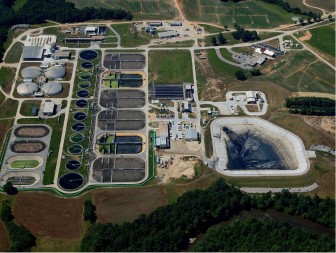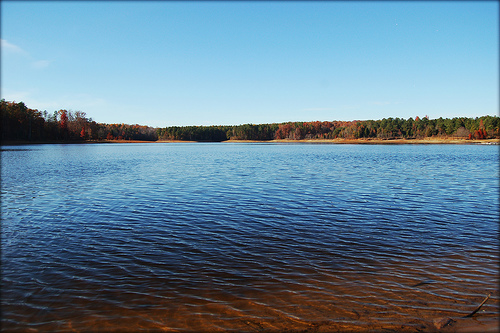As Raleigh grows, so do concerns about protecting its drinking water.
Raleigh is starting to feel development pressures in environmentally sensitive areas, prompting City Councilors to discuss the appropriate way to protect the water supply watershed while fostering that development and growth.
During Tuesday’s work session, Council members examined the city’s current policy of restricting development in the water supply watershed and the merits of using low-impact development (LID) practices.
Watersheds Explained
Watersheds are areas that are especially sensitive to the sediments and pollutants that run off impervious surfaces such as roads and driveways. The small streams and creeks that run through these watersheds end up in larger rivers and lakes before being treated and coming out of our kitchen faucets.

Looking south over Raleigh\’s Neuse River Wastewater Treatment Plant.
Raleigh has three watershed protection areas — Falls Lake, Swift Creek and Little River — that protect the city’s major water sources, Falls Lake and Lake Benson. The Little River is projected to be another source of water in the future.
Today, the city restricts development in watersheds to low-density residential and low-impact commercial, such as schools and churches. The city also generally prohibits the installation of water and sewer infrastructure in these areas, which is intended to limit most large-scale development.
As Raleigh, and the neighboring towns, continue to expand, pressure to develop in these areas begin to mount.
Councilors have made exceptions to this policy, including approving a Lifetime Fitness facility on Falls of Neuse Road and running water and sewer lines to a new fire station in Wake Forest.
“Because this policy evolved over time, it has been unevenly applied,” said Assistant Public Works Director Kenny Waldroup. “And in some areas not all use controls are utilized or available.”
LID Stormwater Devices
Councilors can continue to keep the policy the same, or consider using LID stormwater devices that would treat stormwater on site. These devices — cisterns, rain gardens and bioretention ponds — would have to meet performance-based standards.
Although these methods have been used around the city by developers and residents alike, there is no formal policy that incentivizes or encourages LID.
Among some of the challenges, said Stormwater Program Manager Mark Senior, is the reliance on property owners to maintain these devices.
The city already requires annual inspections for larger stormwater devices. Adding smaller stormwater controls on individual properties would exponentially increase the number of devices the city would have to audit.

Luke Wisley / Flickr Creative Commons
Falls Lake
Waldroup told Councilors that whatever they decide to do, they need to keep in mind that other municipalities are going to follow suit.
“I want to understand the domino effect,” said Councilor Russ Stephenson. “I want to understand the secondary and cumulative impacts.”
Councilor Thomas Crowder was especially concerned with setting a precedent for other municipalities and relying on developers and property owners to maintain the devices.
“I’m not only worried about the precedent on other jurisdictions, but upstream,” he said. “What are folks upstream going to do regarding this?”
Crowder said he’s in favor of LID in the city because it will help control flooding and increase water quality for Raleigh’s downstream neighbors, but was concerned about it being used in the watershed.
Councilors agreed that there are two separate issues: the first is using LID within city and the second is the city’s watershed development policy.
Next Steps
City Manager Ruffin Hall said staff will put together some more information about a stakeholder group that can work together on a set of LID recommendations to be reviewed by the Stormwater Management Advisory Commission.
